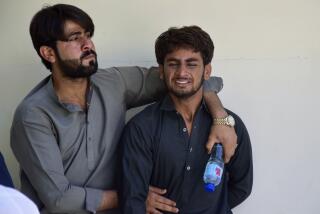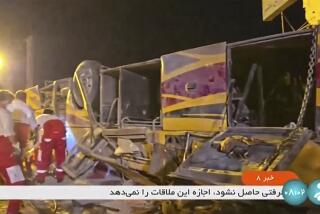Amid Pakistan sectarian violence, Sunnis saved Shiites
ASTORE, Pakistan — The caravan pulled away, leaving behind 19 bullet-riddled bodies in a muddy ditch. Inside the three buses, those spared quietly wept.
The remaining Shiite Muslims had just survived a massacre by Sunni Muslim militants. And the Sunnis aboard had just helped save as many of the Shiites as they could.
Akhtar Hussain, a 37-year-old Shiite survivor, said he turned to the Sunni passengers when he finally disembarked in this tiny mountain hamlet. “I told them, ‘I am grateful to you. If you would have said I was Shiite, I wouldn’t be here right now. May God be with you.’”
What happened on the remote mountain road in August didn’t follow the script. In a country riven by sectarian violence, with automatic rifles pointed at their faces, the Sunni passengers defiantly refused orders from Sunni gunmen to identify Shiites for slaughter.
One Sunni, college student Ghulam Mustafa, 19, confronted the militants, saying that killing Shiites was wrong. He was shot dead, the gunmen pumping seven bullets into his back, chest and head.
“What the Sunni passengers from Astore did should be part of history.” Hussain said. “It was heroic.”
These days, mass killings of Shiites take place with mind-numbing regularity in Pakistan, where intolerance thrives in the midst of government indifference to the plight of minorities.
On Feb. 16, a bomb hidden in a tractor-pulled water tank killed 89 Shiites outside a bustling bazaar in the southwestern city of Quetta. Five weeks earlier, in the same city, twin suicide bomb blasts at a billiards hall in a Shiite neighborhood resulted in more than 90 deaths. And on Sunday, a massive bomb blast ripped through a Shiite neighborhood in Karachi, Pakistan’s largest city, killing 48 people.
The Sunni extremist group that claimed responsibility for the Quetta attacks, Lashkar-e-Jhangvi, has operated in Pakistan since the mid-1990s and has become the nation’s largest, deadliest sectarian extremist organization. The majority of Pakistani Muslims belong to the Sunni sect, and Sunni extremist groups do not view the country’s Shiite minority, about 20% of Pakistan’s population of 180 million, as true Muslims.
The persecution of Shiites reflects a mind-set of intolerance that has seeped into virtually every corner of Pakistani society. Shiites are frequent targets, but so are Christians, Hindus, Sikhs and Ahmadis, members of a Muslim sect whom many Pakistanis view as heretics.
Recently, the Shiite community has become the most targeted for reasons that are unclear. However, human rights groups say provincial government leaders balk at clamping down on Sunni radicals because they wield strong political clout.
Sunnis and Shiites coexist peacefully in many parts of Pakistan, including the cities of Karachi and Gilgit. But even in such places, radical Sunni clerics stoke hatred among some of their followers by preaching the doctrine of Shiite extermination.
Sunni sectarian groups ratcheted up attacks on Shiites last year, killing more than 400 people, human rights organizations say. Many of those killed came from Baluchistan, home to Hazara Shiites, an ethnic group that migrated from Afghanistan more than a century ago. Also hard hit was the Shiite community in Gilgit, in a far northern region hemmed in by three of the world’s most majestic mountain ranges, the Himalaya, the Karakoram and the Hindu Kush.
Shiites on Gilgit-bound buses were targeted three times last year. In the first attack, on Feb. 28, 10 gunmen from a Pakistani Taliban faction stopped a convoy headed from the garrison city of Rawalpindi to Astore and the mountain city of Skardu, executing 16 Shiite passengers.
The second attack was carried out by a mob of enraged Sunnis who set fire to buses with Shiite passengers traveling through the town of Chilas. The April 3 incident, in which 10 Shiites were killed, took place after local Sunni clerics exaggerated the magnitude of a grenade attack on a Sunni rally earlier that day, said Gilgit Home Secretary Faisal Zahoor. The grenade, flung by an unknown assailant, killed two people, but the clerics falsely claimed on mosque loudspeakers that hundreds of Sunnis had died.
The third attack, on the three-bus caravan, occurred Aug. 16. A band of 40 heavily armed men waited until the vehicles, heading from Rawalpindi to Astore, slowed down for a sharp bend on a treacherous mountain road just outside the Gilgit region. The men, dressed in camouflage, were armed with AK-47 rifles, pistols and grenades.
After culling out old men, women and children, the assailants checked national identity cards to single out those with common Shiite names, such as Hussain and Ali. Passengers believed to be Shiite were ordered to one side of the road, Sunnis to the other.
Sunni passengers were then asked to point out people they thought were Shiites. Many could have done so because they came from the same villages. Yet they refused to cooperate, which survivors say saved at least 10 people.
Mustafa, the college student, openly defied the gunmen.
“He said, ‘Why are you doing this? Why do you want to kill these people? Islam doesn’t allow the killing of innocent people,’” said the victim’s brother, Mohammed Iqbal, stating the account given to him by passengers. For speaking up, Mustafa was put on the side of the road with Shiite passengers and later executed.
Hussain, insisting that he was Sunni, may have been saved by the Sunni driver of the bus, Muhammad Zaman, who cried out to one of the gunmen, “Akhtar is my cousin!”
Hussain and Zaman know each other but are not related.
At first, it appeared that Zaman’s bid had no effect. The gunmen ordered the men on the Shiite side of the road, including Hussain, to march toward a ditch. But moments before the group reached the ditch, one of the gunmen pulled Hussain from the line.
After again insisting that he was a Sunni, Hussain was allowed to “race over to where the Sunnis were.”
Moments later, bursts of gunfire rang out. Seventeen Shiites and two Sunnis had been shot. Hussain saw dust billow as the militants fired into the crowd.
When the firing stopped, one of the gunmen approached the other passengers.
“He said, do you know why we killed these people? We killed them because they are deceiving us. They are not Muslims. They say they are Muslims, but they are infidels,” Hussain recalled.
The gunmen allowed the passengers to return to their buses and continue on.
No arrests have been made.
“Among the survivors were both Sunnis and Shiites,” Zaman said, “and the main reason why the Shiites survived was that the Sunnis on the buses refused to cooperate.”
More to Read
Sign up for Essential California
The most important California stories and recommendations in your inbox every morning.
You may occasionally receive promotional content from the Los Angeles Times.










